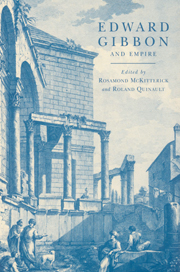
-
Select format
-
- Publisher:
- Cambridge University Press
- Publication date:
- 02 December 2009
- 13 November 1996
- ISBN:
- 9780511599491
- 9780521497244
- 9780521525053
- Dimensions:
- (228 x 152 mm)
- Weight & Pages:
- 0.68kg, 368 Pages
- Dimensions:
- (228 x 152 mm)
- Weight & Pages:
- 0.593kg, 368 Pages
You may already have access via personal or institutional login
Book description
This book examines Gibbon's interpretations of empire and the intellectual context in which he formulated them against a background of the eighteenth- and late twentieth-century knowledge of late antiquity and the Middle Ages. Gibbon's ideas of empire, his understanding of monarchy and the balance of power, his sources and working methods, the structure of the History of the Decline and Fall of the Roman Empire, his attitude towards the barbarians, the contrasting treatments of the eastern and western Empire, his appreciation of past civilizations and their material remains, his audience and their reactions - contemporary and Victorian - are considered in the light of the latest research on eighteenth-century intellectual history on the one hand and on late antiquity, Byzantium and the Middle Ages on the other. The book breaks new ground in taking the form of a dialogue between experts on the fields about which Gibbon himself wrote, and eighteenth-century intellectual historians.
Reviews
‘The essays in this handsome volume … are uniformly learned and polished …’
Early Medieval Europe
Contents
Metrics
Altmetric attention score
Full text views
Full text views help Loading metrics...
Loading metrics...
* Views captured on Cambridge Core between #date#. This data will be updated every 24 hours.
Usage data cannot currently be displayed.
Accessibility standard: Unknown
Why this information is here
This section outlines the accessibility features of this content - including support for screen readers, full keyboard navigation and high-contrast display options. This may not be relevant for you.
Accessibility Information
Accessibility compliance for the PDF of this book is currently unknown and may be updated in the future.


